- Home
- Hammond Innes
The Strange Land Page 6
The Strange Land Read online
Page 6
‘But why?’ I asked. ‘Were you going to arrest him or something?’
‘No. They just wish us to check his papers and report to them. I will inform them that he did not sail after all. Muy buenas, sefior.’
‘Muy buenas.’
I closed the door and turned to Kavan. His eyes were open now and he was listening to the tramp of their feet as they descended the stairs. He was still pale, but his eyes were alert. ‘Were you shamming?’ I said.
‘Ssh!’ He gestured for me to be quiet. ‘Go to the window and check that both of them leave the hotel.’
I walked to the window and pulled the curtains. A jeep was parked down in the street. As I peered out, the sergeant and the Customs officer came out of the hotel and got into it. There was the sound of a starter and then it drove off, turning down towards the plage. ‘They’ve gone,’ I said.
He breathed a sigh of relief and pulled himself up in the bed. ‘Now we’ll fix Wade’s passport. After that everything is straightforward. Will you telephone for a doctor, please?’
He was suddenly calm. He seemed to have no conception of the position he had put me in. I was angry and a little scared. Why couldn’t foreigners behave rationally? And now there was the problem of papers, passports, and official documents. I had committed myself without thinking about that. ‘You know the British Consulate are making inquiries about you?’ I said. And then, when he didn’t answer, I asked him why he’d had to pretend to be Wade. ‘What have you done that you have to hide your own identity?’
He looked at me then and said quietly, ‘I haven’t done anything.’
‘I don’t believe you,’ I said sharply. ‘When you saw the police, you panicked. You must have done something. If you want my help, you’d better tell me’
‘I have done nothing,’ he repeated. ‘Absolutely nothing. Please, you must believe me. I have done nothing that you or any other British person can object to. I give you my word.’
‘Then why pretend to be Wade?’
He pushed his hands through his hair, which was soil dull and sticky with salt water. ‘No,’ he said. ‘Not yet. Maybe when I know you better - when we are out of Tangier.’ He lifted his head and stared out of the window. ‘I came here to start a new life. I have to sail here because it’s the only way I can get out of England. I am a stateless person, you see. And then the owner is lost overboard, the yacht is wrecked and, when I’m brought ashore, I find the police waiting for me there on the beach and asking me if I am Dr Jan Kavan. And then the man Kostos mistakes me for Wade.’ He looked up at me quickly. ‘What would you do? What would you do if you were in my shoes? It’s a gift from the gods. I accept it.’ His shoulders sagged and his voice fell away to a whisper: ‘And then I find my wife waiting there to greet me also - and she turns away because I have said I am Wade.’
He stared down at his feet, his pale hands gripped convulsively round his knees. ‘Last night -1 thought and thought, trying to find a way out. And then, this morning, I wake up and find the police here, and I’m scared. When you’re scared, the mind works very fast. I suddenly knew this was the only way out. I must be Wade. I must continue to be Wade until I am safe inside French Morocco. If I admit I am Jan Kavan, then there will be an inquiry into Wade’s disappearance and’
‘Why should that worry you?’ I demanded. ‘You said last night’
‘I told you the truth,’ he cut in quickly, and then glanced at me nervously as though trying to discover whether I believed him or not. ‘But I can’t tell them the truth,’ he added. ‘Once they know I’m Jan Kavan’ - he hesitated - ‘they will send me back to England. I know they will. I feel it. And I must get to Morocco. I must get to Morocco.’ He looked at me. ‘Please. You want a doctor, don’t you? You want a doctor for your Mission?’
‘Yes, but’
‘Then you must let me enter French Morocco on Wade’s passport.’
‘But why should they send you back to England? What makes you think’
‘Oh, for God’s sake!’ he shouted at me. His voice had that upward trend that it had had the night before when he’d been half hysterical with exhaustion. ‘Just leave it at that. Leave it at that.’
‘All right,’ I said, for he was in a desperately nervous state. ‘But if you enter Morocco on Wade’s passport, your own papers will have no entry stamp. You can’t work at the Mission unless your papers are in order.’
‘I understand.’ He nodded, his forehead wrinkled in thought. ‘But that is something we can sort out later. Maybe I lose my papers, maybe I forge the necessary stamp. I don’t know. But first I must get to Morocco. That is the important thing. And I can’t do that except on Wade’s passport.’
‘But, good heavens, man!’ I said. ‘You’re not Wade’s double, surely. There’s the photograph - the description and his signature, too - you’d never get away with it.’
‘Nonsense,’ he said, his tone suddenly more confident. ‘Do you think I learned nothing during the war? I was six years working in the laboratories at Essen and passing information to the British. Besides, don’t forget I have been shipwrecked.’ He dragged himself to his feet, standing a little unsteadily. And then his voice was suddenly agitated again. ‘Where’s the oilskin bag? I had a little oilskin bag tied round my neck. I had all the papers in it - everything. Did you see it? It wasn’t left on the beach, was it?’
‘No, it’s here somewhere,’ I said. I crossed over to the bed, wishing now that I’d had a look at it last night. ‘It’s among the bedclothes. I threw it here last night.’
But it wasn’t on the bed. It had slipped off on to the couch and was lying under the counterpane. He almost snatched it out of my hand as I held it out to him. ‘You’d better have some food,’ I suggested.
But he shook his head. ‘Not until I’ve seen a doctor.’ He suddenly smiled. It was almost as though the feel of that oilskin bag in his hands had given him back his confidence. ‘If he’s a good doctor, he’ll tell me I’m suffering from lack of food and if the police bother to enquire, they will not be surprised if I recover quickly’
Curiously, I found myself liking him. Behind the nervous tension and the almost neurotic fear of the authorities was a man of considerable personality, a man of drive and energy. Whatever he had done, whatever he was afraid of, he had guts. ‘What are you going to do about the passport?’ I asked.
‘Oh, that’s not too difficult,’ he said, shaking the contents of the oilskin bag out on to the bed. ‘Wade was about my build and colouring. He even had blue eyes-He was thinner and more wiry, that’s all.’ He tossed the blue-covered British passport across to me. ‘I’ll have to fix the photograph, of course.’
The passport was slightly damp, otherwise there was nothing to show that it had come through the surf of Jew’s Bay. On the first page there was the man’s name - Mr Roland Tregareth Wade - and on the next his description: Profession - Company director; Place of birth and date - St Austell, 10 April 1915; Residence -France; Height - 5 ft 11 ins; Colour of eyes — blue: Colour of hair - black. I turned the page and looked at the photograph. It showed him to be a rather good-looking man with a square forehead and black hair. But the cheeks were a little heavy, the broad, full-lipped mouth rather too easy-going, and there were link pouches under the eyes. It wasn’t a dissipated face and :: wasn’t a dishonest face, but somehow it wasn’t quite frank - it was the face of a man about whom one would have reservations.
I looked across at Kavan. ‘What about the photograph?’ I asked him.
But it didn’t seem to worry him. ‘They’re not to know that the passport was wrapped in oilskin,’ he said. ‘By the time they get it the pages will be damp and very dirty. The beard helps, too.’ He rasped his hand over his chin.
‘You seem to have it all worked out,’ I said.
He shrugged his shoulders. ‘A kindly Providence worked it all out for me.’
‘Well, I hope Providence realises its responsibility.’ My mind was running over the possible snags, con
scious that I was thoroughly implicated in the whole business. I glanced down at the passport again, turning the pages. The visa section showed that Wade had travelled extensively - Germany, Austria, Czechoslovakia, Roumania - most of the satellite countries - and Egypt, as well as Britain and France. He had visas for French Morocco, Algeria and Spanish Morocco, but these were not counter-stamped with dates of entry. The final pages for currency were a mass of entries. I tossed the passport back on to the bed beside him. ‘I’ll go and get the patrone to ring for a doctor,’ I said.
He nodded. He had already picked up the passport and was padding across the room to the wash-basin.
By the time the doctor arrived Kavan was back in bed and the passport, now crumpled and dirty, was drying in the sun by the open window. I checked it through. The ink on Wade’s signature on the first page had run badly, so had the figures giving his height which was a good two inches taller than Kavan, and the upper half of the face in the photograph was almost obliterated by a dirty stain. The yacht’s certificate of registration had been treated in the same way, and Kavan had completed the form which the police sergeant had left, the signature shaky, but not unlike what could be deciphered of Wade’s signature.
The doctor was a young, thoroughly efficient Frenchman. He examined Kavan carefully and, after questioning him about what had happened, wrote a prescription for a tonic and advised a diet of meat broth and steak for the next two or three days. He left with a little bow and a handshake, and I went across to the Cypriot restaurant and got Kavan a tray of food. It was the first hot food he had had for over sixty hours.
The passport was almost dry and I took it, together with the other papers, down to the Customs House. There was no difficulty. The sergeant was there and he only gave a cursory glance at the passport before stamping it. Officially Kavan was now Wade and I walked out into the hot sunshine with a light heart and a feeling of relief. The way was now clear for me to return to Enfida.
It was odd, but I felt no qualms, no sense of apprehension. Just as soon as Kavan was fit to travel, I could shake the dust of Tangier off my feet. That was all I was thinking all out as I walked back to the hotel. Wade was dead. An investigation into how it happened would serve no useful purpose. There remained only the yacht. The waves were still pounding heavily at the sands and one of the Customs officers had told me that the wreck was breaking up fast. The Lloyd’s representative would have to be contacted about the insurance to avert suspicion. After that, the Wade who had arrived in Tangier could simply disappear.
I imagined Kavan would be sleeping after his food, but instead there was the sound of somebody talking beyond the closed door of my room. I hesitated, and then I heard a voice that I recognised say, ‘What you are running is no business of mine. I am interested only in the deeds of Kasbah Foum.’ It was Kostos.
Kavan made some reply that was inaudible, and then the Greek’s voice cut in: ‘You are lying. I know that you visited Marcel Duprez’s lawyers in Rouen. I know that — ‘ He stopped abruptly as I pushed open the door.
Kavan was sitting up in the bed, the blankets pulled rightly round his naked body. Kostos was standing by the couch. They were both looking towards the door as I entered. They were quite still like a tableau, and the tension in the room was something that you could feel. “What are you doing here, Kostos?’ I demanded angrily.
‘Nothing. Nothing that is to do with you. You keep out of this, Lat’am.’ His eyes switched to Kavan. ‘Think it over, my friend.’ He began buttoning up his raincoat. Ali is a fool. I tell him that when I know that in Cairo he arranges for you to act as the contact man. Your reputation is no dam’ good. But you double-cross me and you find yourself out on the Marchan with a knife in your back.’ He fished in the pocket of his waistcoat and flipped a piece of pasteboard on to the blankets on Kavan’s feet. ‘Come to my office as soon as you are recovered. An’ no more nonsense, you see. This is not Europe. This is North Africa, and all out there’ - he waved his hand towards the uncurtained windows - ‘it is an Arab world with only a thin layer of white peoples who tread a careful step.’ He put his hat on, pulling it down with a quick tug at the brim, and then turned to go -
As he passed me, he paused, tapping the side of his nose. ‘Not a sparrow falls. Remember, Lat’am. An’ don’t do nothing silly, eh?’ He pushed past me and went out, slamming the door behind him.
I turned to face Kavan, who was still sitting up in the bed. ‘What’s all this about?’ I demanded. ‘What did Kostos want?’
‘Some papers - a cargo. How the hell do I know? Kostos is a part of Wade’s world.’ He shrugged his shoulders. He wasn’t scared; not the way he had been when the police had been in the room. But there was a tautness in his voice that showed his uneasiness. ‘Wade was a crook,’ he added.
‘Then why in God’s name did you sail with him?’
‘I told you before - because I am a Czech and a refugee and it’s the only way I can get out of England.’
‘But if you knew he was a crook — ?’
‘I didn’t discover that till later.’ He lay back and put his hands behind his head. ‘He came and saw me in London and it was agreed that I should sail with him to Tangier’ I knew nothing about him, except that he wanted — ‘ He stopped there. ‘Can I have a cigarette please?’
I handed him the packet and lit one myself. ‘Well, when did you discover he was running something?’ I asked.
‘We ran into a gale off Ushant,’ he said. ‘We could easily have slipped into the lee of the islands through the Chenal du Four and put into Brest. Instead, he stood out into the Atlantic, beating into the teeth of it to clear the coast of France. He said he wasn’t taking any chances. That’s how I knew.’
‘But what about the Customs when you left Falmouth?’
‘We didn’t clear Customs. He said there was no need.’
‘What was he running?’
He shrugged his shoulders. ‘Currency, securities - how do I know? When I asked him, he told me to mind my own damn business. He didn’t talk about his own affairs.’
‘Did you know Kostos would be waiting for you when you arrived ?’
‘Of course not.’
“But when he came up to you on the beach - why didn’t you tell him you weren’t Wade?’
He pushed himself up on to his elbow. ‘Because the police are there. Because I have to escape from myself, from all the past. Now leave it at that, will you?’ He lay back, breathing heavily. ‘I’m sorry, Latham,’ he murmured. ‘It’s just that I’m tired. As soon as we’re clear of Tangier — ‘
‘But we’re not clear of Tangier yet,’ I reminded him. “What exactly did Kostos say? Had he been here long?’
‘No.’ He hesitated, looking at me uncertainly out of the corners of his eyes. ‘He wanted some documents. He said that I’d been employed by an Arab to get them.
He meant, of course, that Wade had.’ He paused and then asked me if I knew anything about an Arab called Ali d’ Es-Skhira.
‘Yes,’ I said. ‘He’s a nationalist; a fanatic. The French deported him from Morocco after he’d caused serious rioting in Marrakech. He lives in Tangier now. Why?’
‘Nothing. It doesn’t matter.’
‘What happened next?’
‘I told Kostos I hadn’t been able to get the documents’, and he got angry and called me a liar. Then you came in.’
‘Did Wade mention these documents to you?’
‘I told you, Wade didn’t talk about his affairs.’
He was trying to hide something. I could sense it. ‘Kostos described them as the deeds of Kasbah Foum.’ He stared at me sullenly, not saying anything. I went over and sat on the bed. ‘Now look here,’ I said. ‘You’re getting yourself mixed up in something dangerous. I know this town. I’ve been part of it - that was what turned me into a missionary. Kostos is not a man to play around with. And if you’re mixed up with Ali d’ Es-Skhira as well…’
‘But I’m not,’ he protested. ‘I don’t know
anything about it.’
‘Oh yes, you do. You know all about this place Kasbah Foum. When you regained consciousness in this room last night, one of the first things you asked me — ‘
‘All right. I do know about Kasbah Foum. But it’s nothing to do with you, Latham.’ He was sitting up again and his voice was angry. We stared at each other for a moment and the atmosphere between us had grown suddenly tense. Then he gradually relaxed. ‘I’m sorry,’ he murmured. ‘Maybe later, when we’re out of this place, I’ll explain….’ He lay back and closed his eyes. There was an obstinate set to his mouth.
I hesitated. Maybe I could shock the truth out of him.
‘Tell me one thing,’ I said. ‘Did you get possession of those deeds after Wade went overboard - or before?’
His eyes flicked open and there was a surprised look on his face. ‘You mean — ‘ His mouth stayed open slightly, and then he rolled over in the bed so that he faced me. ‘Now listen, Latham. I didn’t kill Wade, if that’s what you’re getting at. It happened just as I told you.’
‘It was the deeds I asked about.’
‘The deeds?’ He stared at me.
‘When did you get them out of him?’
‘I didn’t get them out of him.’ His voice was angry. ‘How could I? He never had them.’
‘How do you know?’
‘Oh, for God’s sake!’ he shouted at me. ‘Leave it at that, will you? Wade didn’t have them.’
‘All right,’ I said, getting to my feet. ‘But it’s a pity you didn’t bother to convince Kostos of that.’ I stubbed out my cigarette. It was no good worrying about it. The thing to do was to get out of Tangier as quickly as possible. ‘How do you feel?’ I asked him. ‘I see you ate the steak I brought you.’
‘Yes.’ He smiled and added quickly, ‘It was the most wonderful steak I have ever eaten.’
‘And you weren’t sick?’
‘No.’
‘How do you feel then?’
‘Not too bad. A little tired, and my body’s still sore. Otherwise, I’m all right. I think I’ll try and get some sleep.’

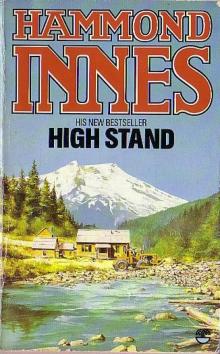 High Stand
High Stand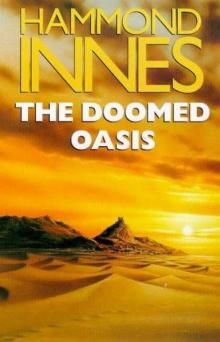 The Doomed Oasis
The Doomed Oasis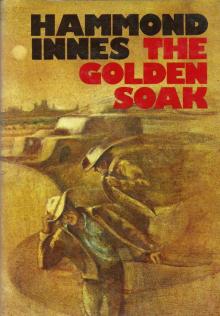 Golden Soak
Golden Soak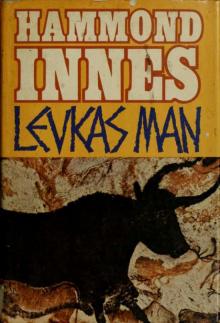 Levkas Man (Mystery)
Levkas Man (Mystery)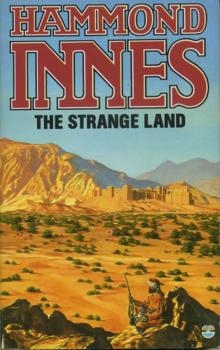 The Strange Land
The Strange Land Dead and Alive
Dead and Alive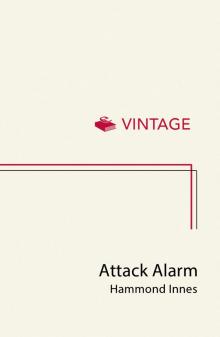 Attack Alarm
Attack Alarm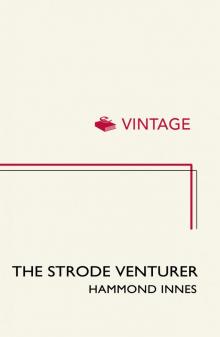 The Strode Venturer
The Strode Venturer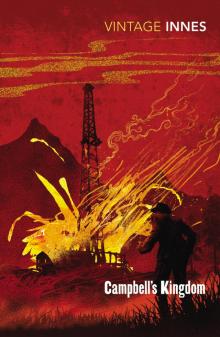 Campbell's Kingdom
Campbell's Kingdom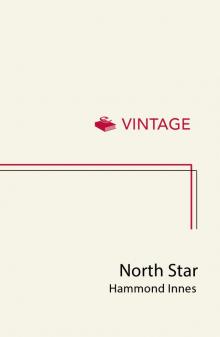 North Star
North Star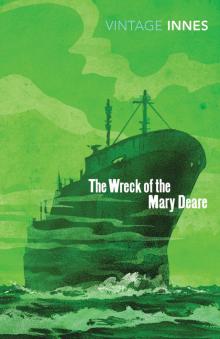 The Wreck of the Mary Deare
The Wreck of the Mary Deare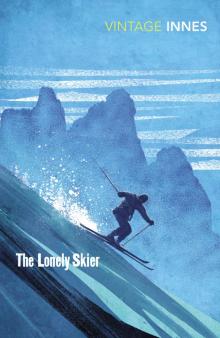 The Lonely Skier
The Lonely Skier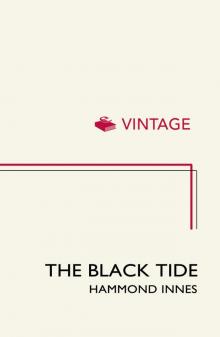 The Black Tide
The Black Tide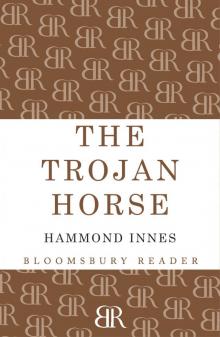 The Trojan Horse
The Trojan Horse Medusa
Medusa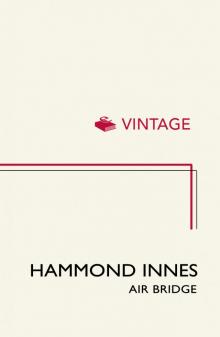 Air Bridge
Air Bridge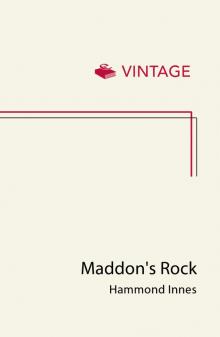 Maddon's Rock
Maddon's Rock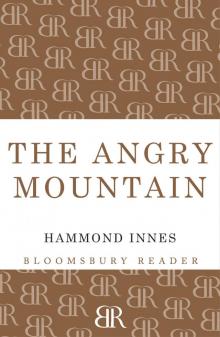 The Angry Mountain
The Angry Mountain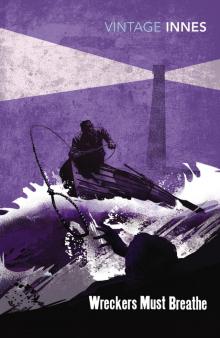 Wreckers Must Breathe
Wreckers Must Breathe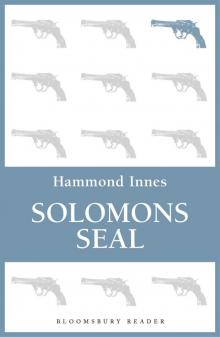 Solomons Seal
Solomons Seal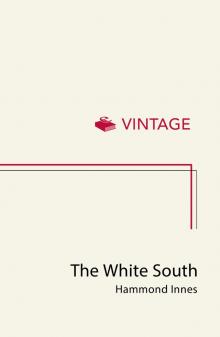 The White South
The White South